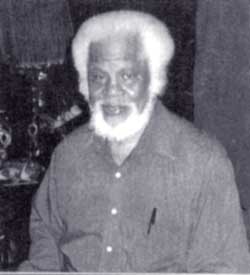In memoriam
Gil Banks
Harlem labor leader
By
Sue Davis
Published Aug 14, 2006 8:33 PM
GIL BANKS—African-American
organizer/activist, Harlem labor leader, historian, researcher, linguist,
surveyor, trumpet player and Pan-African revolutionary—accomplished so
much in his 80 years.
Chief among his varied accomplishments was that he
inspired and motivated others of all nationalities to join the struggle against
racism, inequality, poverty, imperialist war and all forms of injustice.
“For many, many years Gil Banks was the main organizer at Harlem
FightBack, and a leader in the struggle to break down the racism in the
construction industry and get jobs for Black and Latin@ workers at construction
sites throughout New York and beyond,” Larry Holmes, leader of the
anti-imperialist Troops Out Now Coalition in New York City, told Workers World.
“Gil’s legacy is that he was defiantly in the front ranks of
militant and fearless fighters who brought the fight for jobs and economic
justice into the civil rights and Black liberation movement,” Holmes
concluded.
Banks, an ex-GI, founded BAND—Blacks Against Negative
Dying—to oppose the racist, imperialist U.S. war against Vietnam. In the
early 1960s, Eddie Oquendo joined the Brooklyn chapter of the Congress on Racial
Equality, where he met Banks and soon became a member of BAND. Oquendo was
motivated to defy the draft and spent 26 months in federal prison, between 1968
and 1970, rather than fight a war of aggression against other people of color.
Oquendo told Workers World, “Gil continues to inspire me every day
of my life.”
A heartfelt, overflow memorial service for Banks on
July 15 was ably led by anti-imperialist labor leader Brenda Stokely.
Wing
Lam of the Chinese Workers Associ ation told a moving story about how Banks had
wholeheartedly responded when the CWA needed help organi zing restaurant workers
in Chinatown. Lam paid tribute to Banks’ willingness to share and to teach
all he knew to help CWA and said Banks’ guidance helped win the struggle.
Others who paid tribute to Banks included Jim Horton, president of Harlem
FightBack, who detailed his dedication and commitment to the struggle for
economic justice for Black and Latin@ workers.
Doris Turner, former
president of Service Employees Local 1199, acknowledged Banks’ many
contributions to organized labor in New York City for more than three decades.
Playthell Benjamin, head of Radio Free Africa on commercial-free WBAI,
lauded Banks’ research into African history and culture, his political
analysis of Africa as the cradle of civilization, and his critical analysis of
the writings of Black nationalists.
Many speakers referred to Banks as a
Renaissance figure.
As the program noted: “Gilbert Banks was a free
thinker, a true revolutionary. He was an educator, studied African history and
was passionate about sharing knowledge. He was an indomitable spirit and was
ahead of his time. He was known in Harlem as the new Frederick Douglass.”
Articles copyright 1995-2012 Workers World.
Verbatim copying and distribution of this entire article is permitted in any medium without royalty provided this notice is preserved.
Workers World, 55 W. 17 St., NY, NY 10011
Email:
[email protected]
Subscribe
[email protected]
Support independent news
DONATE


